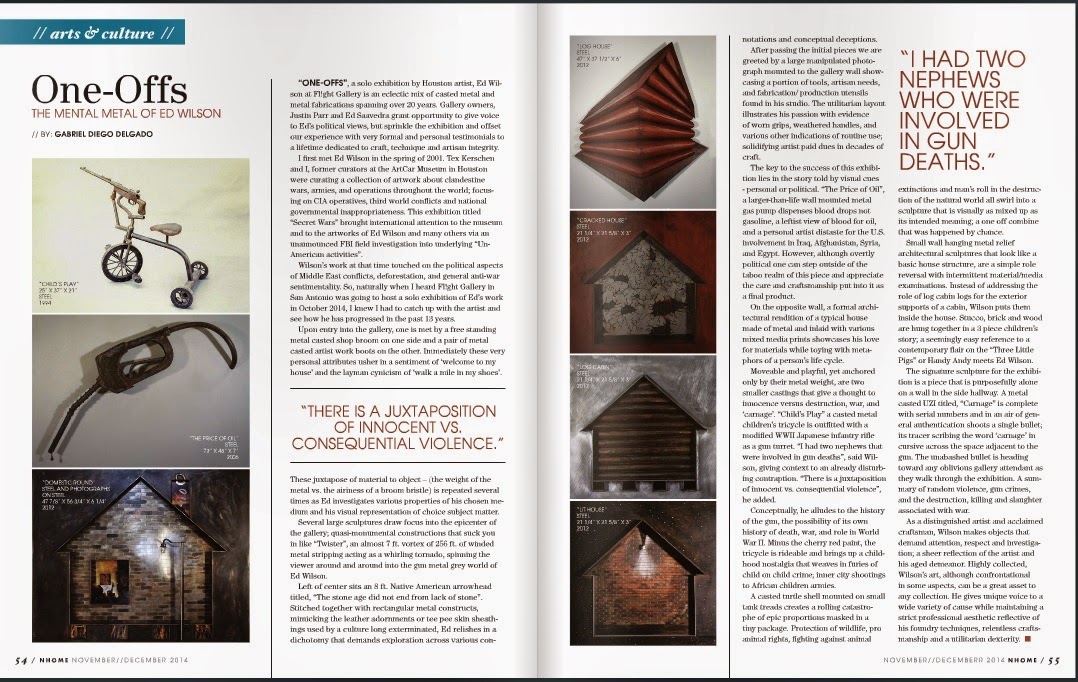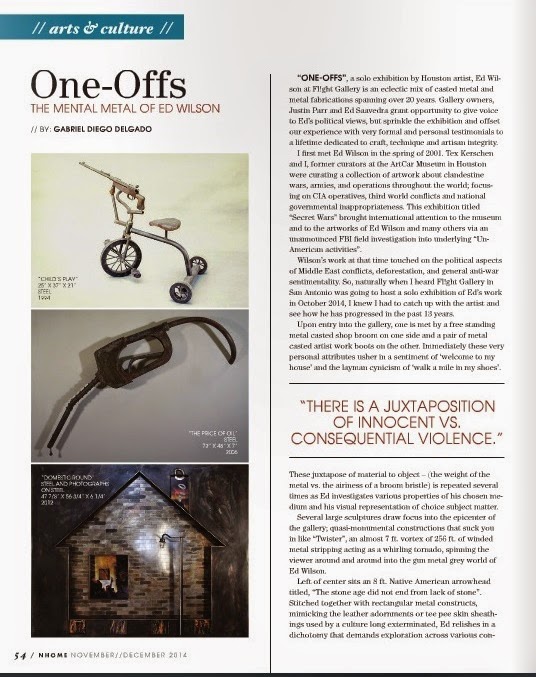Ed Wilson at Fl!ght Gallery Exhibition Review
Ed Wilson
One-Offs
Fl!ght Gallery
134 Blue Star San Antonio, Texas 78204
*** As Seen in the Nov./ Dec. Edition of NHOME Magazine
read the full edition of NHOME here at:
October 2014
“One-Offs”, a solo
exhibition by Houston artist, Ed Wilson at Fl!ght Gallery is an eclectic mix of
casted metal and metal fabrications spanning almost over 20 years. Owners, Justin Parr and Ed Saavedra grant
opportunity to give voice to Ed’s political views but, sprinkle the exhibition and
offset our experience with very formal and personal testimonials to a lifetime dedicated
to craft, technique and artisan integrity.
I first met Ed Wilson in the spring of 2001. I, and Tex Kerschen, former curators at the
ArtCar Museum in Houston were curating a collection of artwork about
clandestine wars, armies, and operations throughout the world; focusing on CIA
operatives, third world conflicts and national governmental inappropriateness. This
exhibition titled “Secret Wars” brought international attention to the museum
and to the artworks of Ed Wilson and many others via an unannounced FBI field investigation
into underlying “Un-American activities”. Wilson’s work at that time touched on
the political aspects of Middle East conflicts, deforestation, and general
anti-war sentimentality. So, naturally when I heard Fl!ght Gallery in San
Antonio was going to host a solo exhibition of Ed’s work in October 2014, I
knew I had to catch up with the artist and see how he has progressed in the
past 13 years.
Upon entry into the gallery, one is met by a free standing
metal casted shop broom on one side and a pair of metal casted artist work
boots on the other. Immediately, these very personal attributes usher in a
sentiment of ‘welcome to my house’ and the layman cynicism of ‘walk a mile in
my shoes’. These juxtapose of material to object – (the weight of the metal vs.
the airiness of a broom bristle) is repeated several times as Ed investigates
various properties of his chosen medium and his visual representation of choice
subject matter.
Several large sculptures draw focus into the epicenter of the gallery;
quasi-monumental constructions that suck you in like “Twister”, an almost 7 ft.
vortex of 256 ft. of winded metal stripping acting as a whirling tornado,
spinning the viewer around and around into the gun metal grey world of Ed
Wilson.
Left of center sits an 8 ft. Native American arrowhead
titled, “The stone age did not end from lack of stone”. Stitched together with rectangular metal
constructs, mimicking the leather adornments or tee pee skin sheathings used by
a culture long exterminated, Ed relishes in a dichotomy that demands
exploration across various connotations and conceptual deceive-ments.
After passing the initial pieces, we are greeted by a large
manipulated photograph, mounted to the gallery wall showcasing a portion of
tools, artisan needs, and fabrication/ production utensils found in his studio.
The utilitarian layout illustrates his passion with evidence of worn grips,
weathered handles, and various other indications of routine use; solidifying artist
paid dues in decades of craft.
The key to the success of this exhibition lies in the story
told by visual cues; personal or political. “The Price of Oil”, a larger- than-life
wall mounted metal gas pump dispenses blood drops not gasoline, a leftist view
of blood for oil and a personal artist distaste for the U.S. involvement in
Iraq, Afghanistan, Syria, and Egypt. However, although overtly political one
can step outside of the taboo realm of this piece and appreciate the care and
craftsmanship put into it as a final product. On the opposite wall, a formal
architectural rendition of a typical house made of metal and inlaid with
various mixed media prints showcases his love for materials while toying with
metaphors of a person’s life cycle.
Moveable and playful, yet anchored only by their metal
weight are two smaller castings that give a thought to innocence versus
destruction, war, and ‘carnage’.
“Child’s Play” a casted metal children’s tricycle is
outfitted with a modified WWII Japanese infantry rifle as a gun turret. “I had
two nephews that were involved in gun deaths”, said Wilson, giving context to
an already disturbing contraption. “There is a juxtaposition of innocent vs.
consequential violence”, he adds.
Conceptually, he alludes to the history of the gun, the possibility of
its own history of death, war, and role in World War II. Minus the cherry red paint, the tricycle is
ride-able and brings up a childhood nostalgia that weaves in furies of child on
child crime; inner city shootings to African children armies.
A casted turtle shell mounted on small tank treads creates a
rolling catastrophe of epic proportions, masked in a tiny package. Protection
of wildlife, pro animal rights, fighting against animal extinctions and man’s
roll in the destruction of the natural world all swirl into a sculpture that is
visually as mixed up as its intended meaning; a one off combine that was
happened by chance.
Small wall hanging metal relief architectural sculptures
that look like a basic house structure are a simple role reversal with
intermittent material/media examinations. Instead of addressing the role of log cabin
logs for the exterior supports of a cabin, Wilson puts them inside the house.
Stucco, brick and wood are hung together in a 3 piece children’s story; a
seemingly easy reference to a contemporary flair on the “Three Little Pigs” or
Handy Andy meets Ed Wilson.
The signature sculpture for the exhibition is a piece that
is purposefully alone, on a wall in the side hallway. A metal casted UZI
titled, “Carnage” is complete with serial numbers and an air of general
authentication shoots a single bullet; its tracer scribing the word ‘carnage’
in cursive across the space adjacent to the gun. The unabashed bullet is heading toward any
oblivious gallery attendant, as they walk through the exhibition. A summary of random violence, gun crimes, and
the destruction, killing and slaughter associated with war.
As a distinguished artist and acclaimed craftsman, Wilson
makes objects that demand attention, respect and investigation; a sheer
reflection of the artist and his aged demeanor.
Highly collected, Wilson’s art, although confrontational in some
aspects, can be a great asset to any collection. He gives unique voice to a wide variety of
cause while maintaining a strict professional aesthetic reflective of his
foundry techniques, relentless craftsmanship and a utilitarian dexterity.
© Gabriel Diego Delgado
.jpg)
.jpg)
.jpg)
.jpg)






Comments
Post a Comment